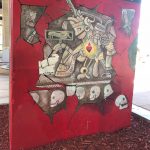I hope this makes its way onto the blogs made by other students for Race and Oral History. This’ll be some kind of blog/field note/reflection/diary/something. I’ll figure it out later.
On May 3rd I made my first site visit to the United Women of East Africa. I arrived alone in my own car, the other 2 people who were coming weren’t there yet so I felt lost. Being the idiot I am, I hadn’t made any site visits until that point. While I hate to use the phrase “better late than never”, that’s what I had to work with. One of the women who work at UWEAST gave me a tour of the facilities, and it felt… homey. Despite having never been to UWEAST it felt familiar, safe. From when I was 7 weeks old until I was 11, I stayed at a daycare in a woman’s residence while my parents (both then-active duty sailors in the US Navy), and it became a second home. Having grown up with her as a third parent/grandparent was how I learned Spanish, and can connect to Mexican culture (though I’ll refrain from claiming it). This space, as foreign as it was to me, felt more like home than the house I live in now, or even the house I lived in after we moved to Bonita. I can’t describe it.
The children who I was supposed to help tutor arrived at around 4:30ish at the Sudanese Center. Being as how I’ve never tutored anyone in my life, and how I’d never been to the Sudanese Center, I was afraid that this site visit was going to be an utter disaster. I tutored a 10-year-old boy named Fêrá (Author’s Note: neither he nor I know how to spell his name so I’m relying on my English and French to sound it out so Please Bear With Me.) Fêrá and his family are immigrants from a village in Tanzania, where, from what other tutors had told me, barely covered arithmetic of whole numbers, so Fêrá was very much out of his depth. From what he told me and Isabella, his teacher at Euclid Elementary was no help to him. Like Fêrá, I was also struggling. In my life, I’ve never had trouble with any kind of arithmetic, so trying to teach basic arithmetic to a kid (especially one who I’d never met before) who is struggling and falling behind posed a unique and stressful challenge. I didn’t want to fail Fêrá. (Author’s Note: his name may just be spelled “Fera” but I like my Frenglish spelling better, French post-colonial cultural dictation notwithstanding.)
Once I realized that I had to go back to the basics of adding and subtracting fractions, and stepped the process out, there seemed to be a “eureka” moment for Fêrá. He was learning to do fractions but also multiplying at the same time. I feel like I was connecting with Fêrá, and that I was actually doing some good. I felt genuinely good, something I hadn’t experienced in a long time. Unfortunately, I had to leave at 5:30pm, half an hour before tutoring ends (and an hour before the Sudanese Center closes). I had a 6pm class I had to get to, and I was gonna be damned if I missed it 2 weeks in a row. I told Isabella to help Fêrá finish his homework, and left. That was probably one of the most difficult decisions of my life.
The entire drive up to campus, I was stressed. It had felt wrong to leave Fêrá there in the middle of this moment of discovery and learning. It felt wrong to put my own academics ahead of a child who’s being left behind already. In retrospect, I think tutoring awakened some kind of paternal/fraternal instinct, because in the back of my mind for the next 25 minutes, a voice yelled “Do Not Leave That Child”.
(Author’s Note: since my schedule doesn’t accommodate me being able to go to the Sudanese Center or UWEAST on any day other than Tuesday or Thursday, I missed a lot of the programs UWEAST was holding, so the hopes of being able to know any of the other kids or the people who work there are… slim. Those I do know, I feel like I’m invading their space, trying to take from them by wanting to interview them, and tutoring doesn’t feel like giving back.)
It felt wonderful to help Fêrá, and I was sad that I had to leave.


